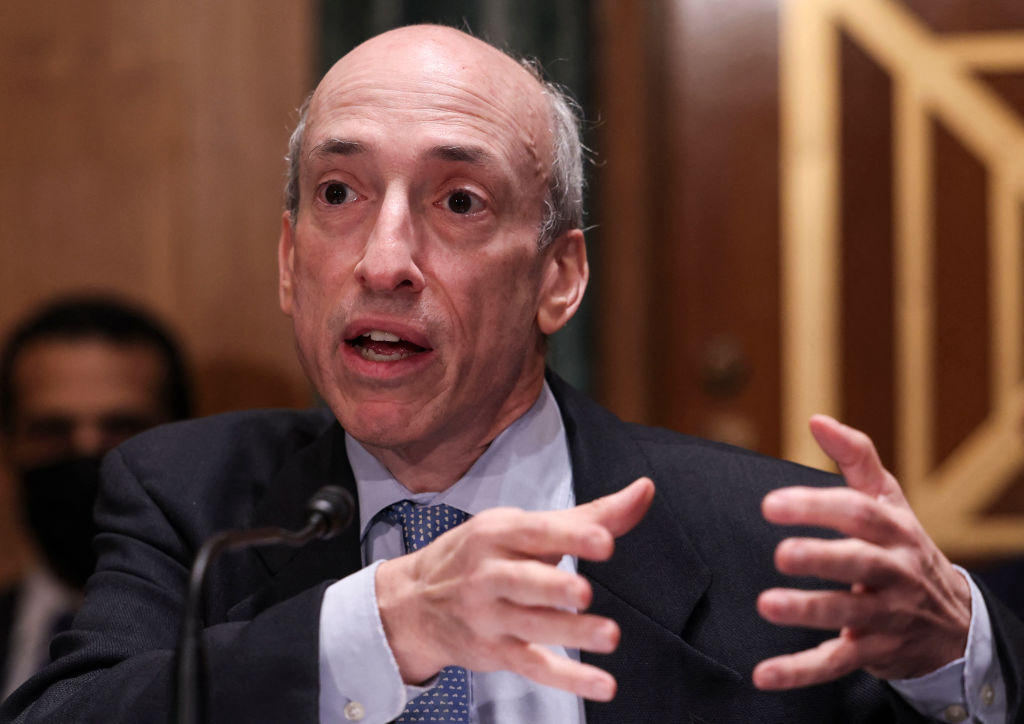There’s growing awareness that climate change threatens the stability of financial markets and presents systemic risks to the U.S. economy. Right now, however, the hundreds of publicly-traded companies in the country are not required to disclose the various ways in which the consequences of a warming planet could threaten their bottom lines. Companies that address climate risks in their annual reports and other public filings choose to do so voluntarily. As a result, many policymakers argue that climate-related disclosures are unreliable, inconsistent, and incomparable across companies, which leaves investors in the dark about the true risks on a company’s books.
Those policymakers are beginning to make progress. On Monday, the Securities and Exchange Commission, or SEC, took the first step toward requiring companies to publicly disclose various climate risks. The long-awaited rule requires companies to explain how climate risks may affect their revenues and profitability in public filings they’re required by law to submit to the SEC. The independent federal agency, which is intended to protect investors by regulating the stock offerings of public companies, has also proposed requiring that companies disclose any climate-related goals they’ve set (such as net-zero targets), how climate risks may affect the line items in their financial reports, and whether they’re taking action to minimize the effect of climate change on their activities.
Most significantly, the proposed rule requires disclosure of the volume of carbon emissions stemming directly from a company’s operations, as well as emissions resulting from the production of electricity and other forms of energy that it relies on, which are referred to as scope 1 and 2 emissions, respectively. The rule also requires some disclosure of the more indirect scope 3 emissions, a category that includes emissions resulting from the use of products that companies sell. Businesses have between one and three years to comply with the rule, if it is adopted.
“Companies and investors alike would benefit from the clear rules of the road proposed in this release,” said SEC chairperson Gary Gensler. “I believe the SEC has a role to play when there’s this level of demand for consistent and comparable information that may affect financial performance. Today’s proposal thus is driven by the needs of investors and issuers.”
The U.S. is playing catchup on climate-related financial rules. The European Union has already mandated similar disclosures and is in the process of strengthening its climate risk rules. Over the last few years, there has been an increasing recognition of the ways in which climate-fueled disasters are wreaking havoc on businesses. The electricity provider PG&E is a prominent example of a publicly-traded company pushed to insolvency due to wildfires fueled by climate change. As a result of risks like these, investors and shareholders have lobbied company boards for more disclosure — and even staged internal revolts when their efforts have met resistance. The United Nations Principles for Responsible Investment, a group that promotes environmentally-friendly practices among investors, has more than 4,000 signatories.
The SEC has a mandate to protect investors by making sure public companies provide them with timely and accurate information about their business practices. The agency, which operates more independently than other federal departments that sit directly under the president’s purview, is tasked with maintaining “fair, orderly, and efficient markets” — and environmental activists argue that climate-related risks fall squarely into its wheelhouse.
Those opposed to the rule, however, say that the agency lacks the authority to issue rules on climate change, a topic they claim should be addressed by environmental agencies alone. Opponents include the American Petroleum Institute, the primary lobbying organization for fossil fuel interests, which has raised concerns about practical problems that could arise from standardizing disclosure, and state officials like the attorney general of West Virginia, who has claimed the rule would require “statements on political issues that drive a political agenda.” Litigation challenging the rule is all but certain.
Businesses have also been pushing the SEC to exclude scope 3 emissions from the rule. Because scope 3 emissions come from across the supply chain, including from purchased goods, smaller supplier companies, and from customers, they are often out of a company’s direct control. The proposed rule requires disclosure of these emissions if the company already has an explicit emissions-reduction goal that includes scope 3, or if such emissions could be considered “material” from the point of view of an investor — if, in other words, a typical shareholder would be likely to consider such emissions relevant to their financial interest in the company. Smaller companies are exempt from the requirement.
Alyssa Rade, chief sustainability officer at Sustain.Life, a technology company that helps businesses track and report their emissions, said the new rule may create positive pressure for companies across supply chains to disclose their emissions.
“While smaller supplier companies may not have already calculated their carbon footprint, increasing pressure from their largest customers compels them to take action,” she said in an email. “This is the exact kind of market pressure U.S. regulators are pursuing by including Scope 3 emissions accounting in the new disclosure ruling.”
The SEC is soliciting comments on the proposed rule for the next 60 days. Once the comment period closes, the agency is expected to consider and potentially revise the rule in response.



